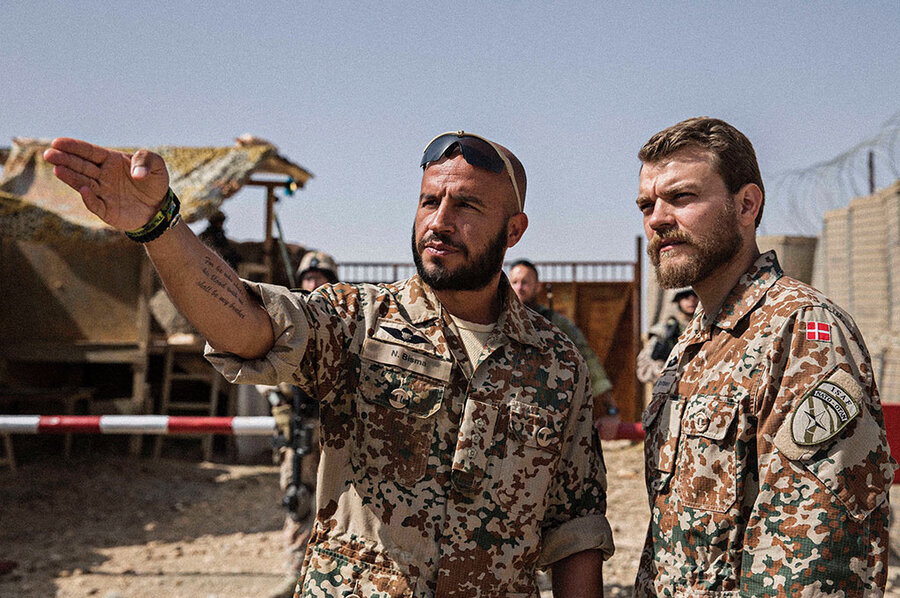'A War': The issues at stake are more complex than the film
Loading...
“A War,” the uneven third film from Danish writer-director Tobias Lindholm and a nominee for the Oscar for best foreign film, is essentially three movies for the price of one. It’s a war-front drama and a home-front drama, intercutting between the two until, in its second half, it crystallizes into a courtroom drama.
Claus Pedersen (Pilou Asbæk, from “Game of Thrones”) is the commander of a unit of Danish soldiers in Afghanistan. Not one to stay behind while his men engage the enemy, Claus puts himself in the thick of the action. Resolutely low-key even in moments of high tension, as when a soldier dies after stepping on a land mine, he’s inspiring to his men but also somewhat impassive. He makes an effort to connect with the locals who are targeted by the Taliban, but his decision not to shelter a fleeing family has tragic consequences. (The film was shot mainly in Turkey but features Afghan refugees and Danish veterans of the war in Afghanistan in the cast.)
A more pointed consequence for the unit comes when Claus, with his soldiers under siege by the Taliban and desperate for one of his wounded men to be airlifted out, orders a nearby house to be bombed. The authorization he seeks is based on a lie: that he saw an enemy combatant in the house. He feels justified in telling the lie because otherwise his man would not have survived, but the bombing ends up killing 11 civilians, including eight children. For this he is brought up on charges. Should he lie before the court and say he had authorization for the airstrike?
As the war-zone drama plays out, Lindholm works in scenes with Claus’s family back in Denmark. His wife, Maria (Tuva Novotny), and their three young children are making do as best they can in his absence and marking time until his return. But when he does come home, it is to face trial. Claus initially had wavered about his decision to lie, but Maria has no such scruple. She lectures him, “You may have killed eight kids, but you have three living ones at home.” This may sound heartless, but the domestic scenes, with their acutely observed reverberations of loss, soften the sting of her words. She is fighting her own battle – for her family.
Lindholm does well enough with the Afghanistan scenes, which are captured documentary-style. I’m not crazy about his jittery camera approach to “realism,” which extends here even to the home-front scenes, but at least the action is straightforward and comprehensible. Claus, however, never entirely emerges as a man conflicted by moral principle. As Asbæk plays him, he’s close to stolid, even when he returns home and, presumably, his guard drops. I thought Claus’s strong-and-silent facade in the film’s first half was a setup for its erasure in the second, but no such luck.
The courtroom machinations are skillfully played, but here, too, there is a certain stolidity. The issues at stake are more complex than the film, which in this part plays out like a Danish “Perry Mason” TV episode, allows for. Claus was wrong to order a bombing without proper authorization, not knowing who was in the house, but at least he did so not out of malice but to save his fellow soldier.
For me, the more devastating incident is that prior one in which the Afghan family Claus turned away is found killed by the Taliban. This is just what the family patriarch, whose ailing son had earlier received medical treatment from the unit’s medic, had predicted would happen if they did not obtain shelter. But Lindholm glides over this catastrophe, which appears to have no real emotional impact on Claus. Under the circumstances, it’s difficult to warm to him as a man in the throes of a moral quandary. And if we are not meant to see him in this way, then why should we care?
Lindholm could also have done more with Maria’s quandary, or, to be more precise, her lack of one. Despite her willful belief that Claus should lie for the sake of his own family, what does it say about her that she dismisses the dead Afghan children as, in effect, collateral damage? Since, prior to her discovery of what had happened on the battlefield, she has been portrayed as a genuinely caring mother, her dismissiveness here cries out for a deeper psychological treatment than Lindholm provides. In her own way, Maria is just as opaque as Claus.
At heart, Lindholm may be more of a documentarian, a glib documentarian, than he realizes. He goes with the surface of things. Grade: B- (Rated R for language, war-related images.)







